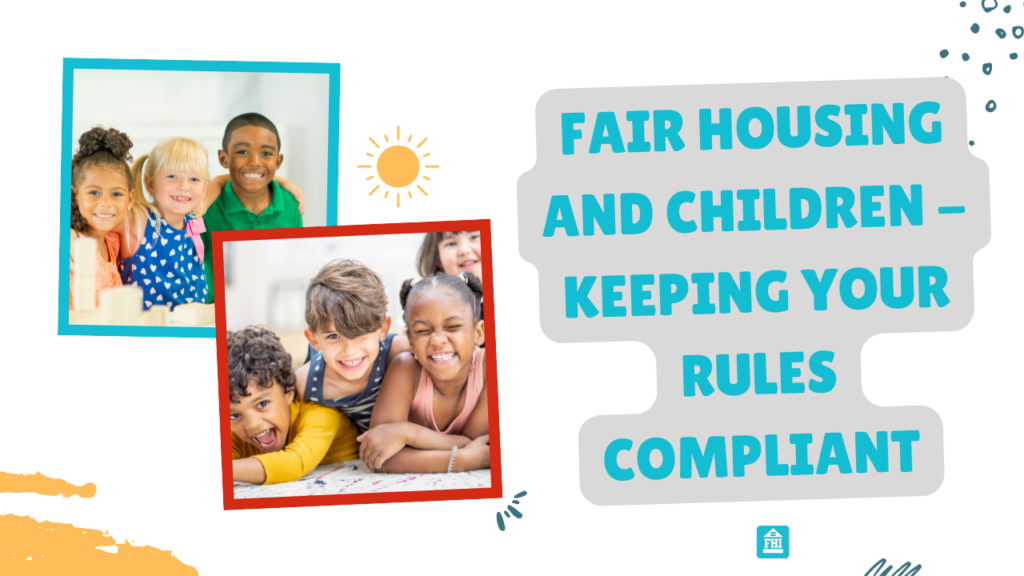Could your community’s rules and policies be considered discriminatory, especially where children are concerned? How can you ensure that your rules are fair housing compliant? Leslie Tucker returns to share her insights and give you clear guidelines to follow when creating or reviewing your community policies and rules.
Estimated reading time: 4 minutes

Table of contents
As we know, one of the protected categories included in the Fair Housing Act is Familial Status, which prohibits any discrimination against any applicant or resident with children under the age of eighteen. What is protected is more than the apparent outright discrimination or steering; things like how community rules and policies are written and enforced come into play, especially regarding children.
When it comes to rules that apply to children, things can get tricky. You cannot have blanket rules restricting children’s use or access to parts of your property. You can have rules that outline the need for supervision as long as they are not unreasonable and have a legitimate reason, i.e., safety.
Understanding what is and isn’t acceptable when creating community rules is crucial to avoid any appearance of discrimination. In this article, we will review the most common rules you see in multi-family communities and discuss whether they are reasonable or not.
Persons under the age of 12 must be accompanied by an adult when using the pool.
This rule is probably one of the most common ones that we see in communities. Obviously, there are safety concerns when it comes to children and pools. However, a point of caution would be to ensure that the ages chosen are not too restrictive or have a policy of a case-by-case basis for exemption. For example, what if children are being supervised by a babysitter that is an excellent swimmer but is only 16? Caution is needed to ensure everyone’s safety of course, but within reasonable limits.
Due to safety concerns, children are prohibited to run and play outside within the complex gates.
You cannot completely restrict the use of common areas. Here we see a rule that would definitely be flagged for being over-restrictive. Suppose children are causing a problem such as damaging property or affecting other residents’ use of these areas. In that case, you can let the parents know that these rules are being broken and will result in a lease violation.
Skateboarding is prohibited on community property.
As it is written, this rule would be considered acceptable. The reason for this is that it doesn’t single children out. It clearly states that ALL skateboarding is prohibited, meaning it applies to everyone regardless of age.
Nobody under the age of 18 is allowed in the Business Center without adult supervision.
Here we see another common supervision rule. Of course, you want to protect your property’s expensive equipment. However, since most high school students use technology daily, restricting this area to 18 and over could be considered an unreasonable restriction.
Children under the age of 14 are prohibited in the gym.
This rule could definitely land you with a charge of discrimination. It completely blocks access to children under the age of 14, which violates their protected category status. A better practice would be to institute reasonable supervision rules.
Pool hours: Adults 18+ – 10 a.m. – 9 p.m. Children under 18 – 10 a.m. – 6 p.m.
Again, this rule completely blocks children’s access between 6 p.m. and 9 p.m., which could be considered discriminatory or too restrictive. Once more, a better practice would be to focus on good supervision rules.
Quiet hours (11 p.m. – 7 p.m.) will be enforced. No excessive noise, fireworks, music, or any other disturbances will be allowed.
Many communities have “quiet hours” rules which are okay because they do not list children specifically. The problem that could come into play is if a community tried to enact a curfew. That clearly would not work with adults, so it would then only apply to children, which again would be discriminatory. The way this rule is written is neutral enough to include everyone, and as long as it’s enforced the same way, it would be considered reasonable.
No Kids? – Final Takeaway
The best advice to follow when reviewing or creating your community rules and policies is to ask yourself if the language used limits the access or use specifically by children and revise it accordingly. Also, when it comes to creating your supervision rules, be sure that if they are ever questioned, you can clearly explain why they were instituted and what the specific purpose is. Of course, if you are still unsure, consulting a fair housing attorney is always a good idea!
[fusebox_transcript]
You May Also Like:
